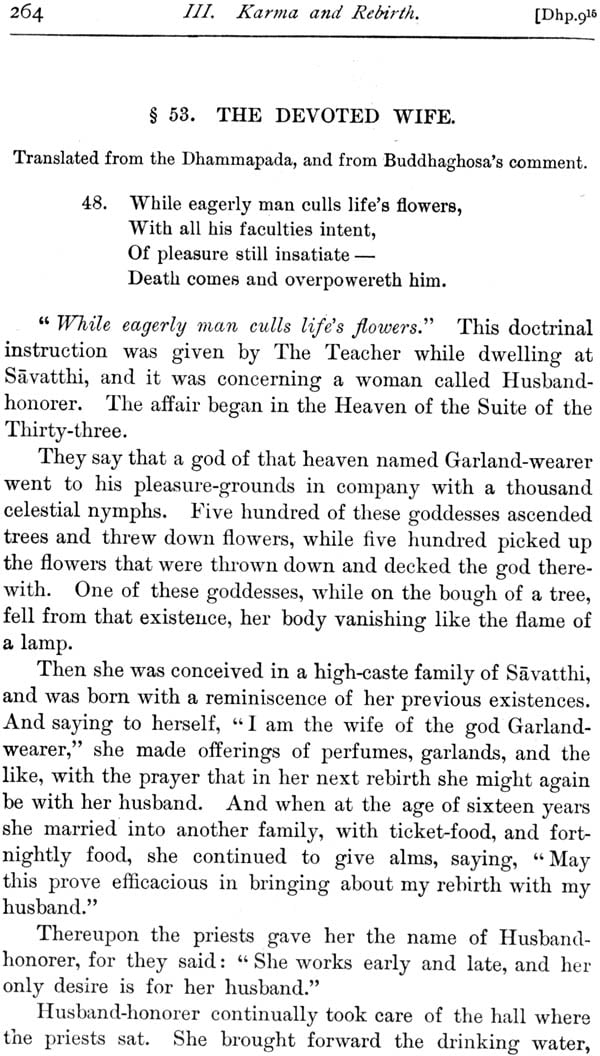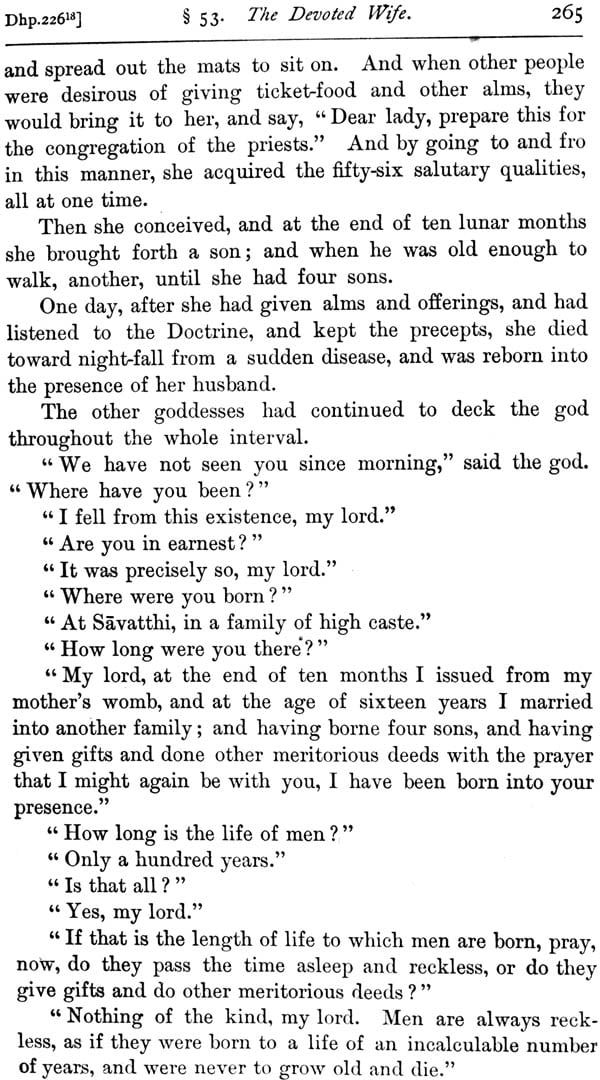
Buddhism in Translations
Book Specification
| Item Code: | IDC124 |
| Author: | Henry Clarke Warren |
| Publisher: | Motilal Banarsidass Publishers Pvt. Ltd |
| Language: | English |
| Edition: | 2002 |
| ISBN: | 9788120811171 |
| Pages: | 538 |
| Cover: | Paperback |
| Other Details | 8.4" X 5.5" |
| Weight | 580 gm |
Book Description
General Introduction
The materials for this book are drawn ultimately from the Pali writings of Ceylon and Burma, - that is to say, they are to be found in palm-leaf manuscripts of those countries, written in the Singhalese or Burmese alphabet, as the case may be, but always in the same Pali language, a tongue very nearly akin to the Sanskrit. These Pali writings furnish the most authoritative account of The Buddha and his Doctrine that we have; and it is therefore to be regretted that, inasmuch as so little has been known in the Occident until recently of either Pali or Pali literature, the information of the public concerning Buddhism has been so largely drawn from books based on other, non-Pali, sources, on works written in the Singhalese, Chinese, and Tibetan languages, and in the Buddhist-Sanskrit of Nepaul. But a large number of Pali manuscripts have now been edited and printed in the publications of the Pali Text Society of London, and in scattered works both in England and in other European countries, and several volumes of translations into English have appeared, so that all excuse for not deriving our knowledge of Buddhism from the most authentic sources is fast disappearing.
As the work on this book has been done wholly in America, my main reliance has naturally been on printed texts. Still, I have had the use of a number of Pali manuscripts. In Brown University at Providence, Rhode Island, there are many manuscripts, in the Burmese character, of works belonging to the Buddhist Scriptures. These were presented by the Rev. Dr. J. N. Cushing, Baptist missionary to Burma, and an alumnus of the University. But the manuscripts which, as being both important and unedited, have proved of most value to me, are four copies of the extensive and systematic treatise on Buddhist Doctrine composed by the famous Buddhaghosa, who flourished in the fourth century A.D. It is called the "Way of Purity" (in Pali, Visuddhi-Magga). These four manuscripts have come to me from England: one is from the private collection of Prof. T. W. Rhys Davids Secretary of the Royal Asiatic Society; the second belonged to the late Rev. Dr. Richard Morris of Harold Wood, Essex; the third to Henry Rigg, Esq., consulting engineer to the Government of India, for railways; while for the loan of the fourth, a Burmese manuscript, my thanks are due to the India Office Library.
Back of the Book
Here is a work that aims at presenting 'different ideas and conceptions; which are 'found in Pali writings'. In the words of Henry Clarke Warren, the author of the volume: 'Translation has been the means employed as being the most effectual The selections of the first chapter are on the Buddha; next follow those which deal chiefly with the Doctrine; while others concerning the Order and secular life constitute the closing chapter of the book.'
The uniqueness of the volume lies in the selective presentation of the materials and their organization. Introductory notes preceding discussion of each chapter, amply annotated, add to its originality. Appendixes and the Index form special features.
This preprint of the volume after its first publication in 1896 and subsequently in 1900 will be welcomed by students as well as researchers of Buddhism.
Henry Clarke Warren was born in Boston in 1854. He was educated in the universities of Harvard and Johns Hopkins. While a student he was attracted to the philosophy of Buddhism and studied it from original Pali sources.
Henry Clarke Warren was one of the authorities on Buddhism and Pali literature. Harvard Oriental Series was instituted on munificent endowment from his earrings. He translated and edited Visuddhi-Magga by Buddhaghosa which was issued as Buddhaghosa's Way of Purity in Harvard Oriental Series (Vol. 41, 1950). He died in 1899.
| Abbreviations | xi | |
| General Introduction | xiii | |
| THE BUDDHA. | ||
| Introductory Discourse | 1 | |
| 1 | The Story of Sumedha | 5 |
| 2 | A List of former Buddhas | 32 |
| 3 | The Characteristics of a Future Buddha | 33 |
| 4 | The Birth of The Buddha | 38 |
| 5 | The Young Gotamid Prince | 48 |
| 6 | The Great Retirement | 56 |
| 7 | The Great Struggle | 67 |
| 8 | The Attainment of Buddhaship | 71 |
| 9 | First Events after the Attainment of Buddhaship | 83 |
| 10 | The Conversion of Sariputta and Moggallana | 87 |
| 11 | The Buddha's daily Habits | 91 |
| 12 | The Death of The Buddha | 95 |
| SENTIENT EXISTENCE | ||
| Introductory Discourse | 111 | |
| 13 | Questions which tend not to Edification | 117 |
| 14 | King Milinda and Nagasena come to an Understanding | 128 |
| 15 | There is no Ego | 129 |
| 16 | All Signs of an Ego are Absent | 146 |
| 17 | No continuous Personal Identity | 148 |
| 18 | The Mind less permanent than the Body | 150 |
| 19 | What is Unity or One? | 153 |
| 20 | Analysis of the Human Being | 155 |
| 21 | The Composition of the Body | 157 |
| 22 | On getting Angry | 159 |
| 23 | The Origin and Cessation of the Human Being | 159 |
| 24 | Inanimate Nature | 164 |
| 25 | The Middle Doctrine | 165 |
| 26 | Ignorance | 170 |
| 27 | Karma | 179 |
| 28 | Consciousness | 182 |
| 29 | Name and Form | 184 |
| 30 | The Six Organs of Sense | 186 |
| 31 | Contact | 186 |
| 32 | Sensation | 187 |
| 33 | Desire | 187 |
| 34 | Attachment | 189 |
| 35 | Existence | 194 |
| 36 | Birth etc. | 201 |
| 37 | Discussion of Dependent Origination | 202 |
| KARMA AND REBIRTH. | ||
| Introductory Discourse | 209 | |
| 38 | Be a Friend to Yourself | 213 |
| 39 | The Cause of Inequality in the World | 214 |
| 40 | Fruitful and barren Karma | 215 |
| 41 | The Death of Moggallana | 221 |
| 42 | Good and bad Karma | 226 |
| 43 | How to obtain Wealth, Beauty, and Social Position | 228 |
| 44 | The Round of Existence | 232 |
| 45 | Cause of Rebirth | 232 |
| 46 | Is this to be my Last Existence? | 233 |
| 47 | Rebirth is not Transmigration | 234 |
| 48 | Reflections on Existence | 242 |
| 49 | Different kinds of Death | 252 |
| 50 | How Existence in Hell is Possible | 253 |
| 51 | Death's Messengers | 255 |
| "The Three Warnings" | 259 | |
| 52 | The Ass in the Lion's Skin | 262 |
| 53 | The devoted Wife | 264 |
| 54 | Friendship | 267 |
| 55 | Virtue is its own Reward | 269 |
| 56 | The Hare-mark in the Moon | 274 |
| MEDITATION AND NIRVANA | ||
| Introductory Discourse | 280 | |
| 57 | The Way of Purity | 285 |
| 58 | Concentration | 288 |
| 59 | The Thirty-one Grades of Being | 289 |
| 60 | The Forty Subjects of Meditation | 291 |
| 61 | The Earth-kasina | 293 |
| 62 | Beauty is but Skin-deep | 297 |
| 63 | The Conversion of Animals | 301 |
| 64 | Love for Animals | 302 |
| 65 | The Six High Powers | 303 |
| 66 | Spiritual Law in the Natural World | 306 |
| 67 | Going Further and Faring Worse | 308 |
| 68 | Sariputta and the Two Demons | 313 |
| 69 | World-cycles | 315 |
| 70 | Wisdom | 330 |
| 71 | The Summum Bonum | 331 |
| 72 | Mara as Plowman | 349 |
| 73 | The Fire-sermon | 351 |
| 74 | The four Intent Contemplations | 353 |
| 75 | The Attainment of the Paths | 376 |
| 76 | Nirvana to be attained at Death | 380 |
| 77 | The Attainment of Nirvana by Godhika | 380 |
| 78 | The Trance of Cessation | 383 |
| 79 | The Attainment of Nirvana | 389 |
| THE ORDER | ||
| Introductory Discourse | 392 | |
| 80 | Conduct | 393 |
| 81 | The Admission and Ordination Ceremonies | 393 |
| 82 | The Serpent who wanted to be a Priest | 401 |
| 83 | The Buddhist Confession of Priests | 402 |
| 84 | The Order receive leave to dwell in Houses | 411 |
| 85 | Residence during the Rainy Season | 414 |
| 86 | The Mendicant Ideal | 417 |
| 87 | The Value of Training in Religion | 420 |
| 88 | The colorless Life | 421 |
| 89 | Can the Saint suffer? | 422 |
| 90 | The Body is an open Sore | 423 |
| 91 | Heaven not the Highest Good | 424 |
| 92 | The Saints Superior to the Gods | 424 |
| 93 | The Anger-eating Demon | 426 |
| 94 | Contentment is Riches | 428 |
| 95 | The Story of a Priest | 430 |
| 96 | The young Stone-Throwor | 432 |
| 97 | "And hate not his father and mother" | 434 |
| 98 | No Buddhist should commit Suicide | 436 |
| 99 | The Admission of Women to the Order | 441 |
| 100 | A Family of Magicians | 448 |
| 101 | The Story of Visakha | 451 |
| 102 | The Buddhist Apocalypse | 481 |
| | ||
| 103 | The Five Groups | 487 |
| INDEX | 497 |







